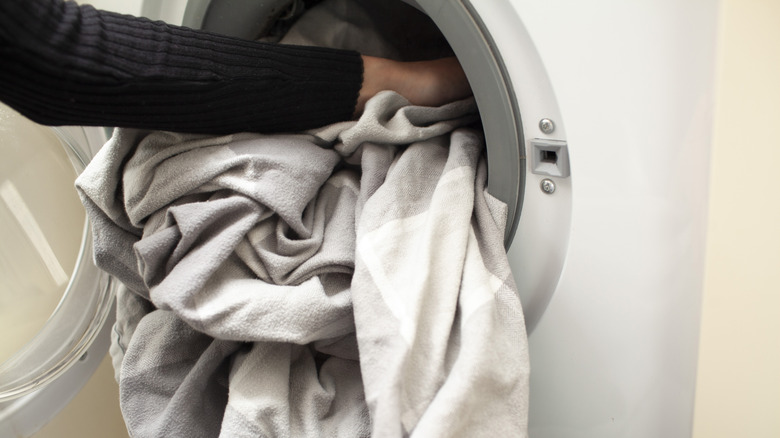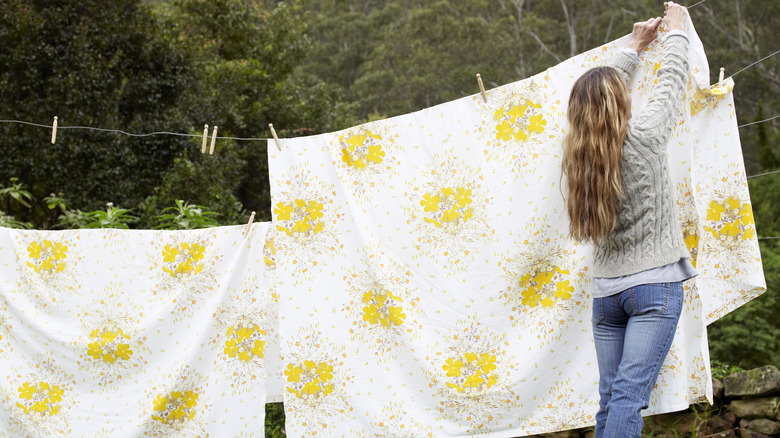The Mistake You Might Be Making With Your Bedsheets
For most homeowners, it's a rarity to be accused of overcleaning. Yet, when it comes to washing bedsheets, a far greater percentage of the population has been shamed as underwashers than overwashers. But the labeling may be unfairly warranted. According to an organizational expert, you may be making a mistake with your bedsheets if you wash them more than once a month.
The revelation is a record-scratch moment many lax cleaners have longed for in order to validate their inconsistent laundering efforts. Maeve Richmond, founder of the organizing coaching firm Maeve's Method, claimed to Taste of Home that the frequency in which bedsheets are sanitized is a personal decision; however, if you don't sweat profusely while sleeping or you're not a stickler for beds that smell amazing, then going a month between washings is perfectly acceptable.
Score one for every person who considers stripping a bed and washing sheets to be an excruciatingly painful chore. Or at least half of one. Turns out Richmond's remark comes with a caveat — lest you think she is a complete savage when it comes to cleaning. The organizational advocate maintains that bedsheets should be washed more often if you sleep in the buff, are sick, or if you jump into bed immediately following a sweaty workout (via HuffPost). However, if none of these scenarios apply to you, Richmond suggests avoiding the mistake of habitual washing in order to spare your bedsheets from excessive wear and tear.
The cons of frequent bedsheet washing
Given the amount of dirt, body secretions, dead skin cells, and dust mites that accumulate on sheets in a single night, the Sleep Foundation recommends washing bed linens once a week, or every three to four days if you suffer from asthma, allergies, or you routinely allow your pet to snuggle under the covers with you.
However, if you only own one or two sets of bedsheets, washing them on a weekly basis will — over time — lead to faded coloring and fabric fatigue, and may potentially compromise the integrity of fitted sheets' elastic corners. Overcleaning may be considered a mistake if you're concerned about preserving the quality of your linens; however, it's not just how often you wash your bedsheets, but the manner in which you do so that matters.
For example, if you're trying to save time by cramming sheets from all of the beds in your home into a single washing machine at the same time, you're accelerating deterioration. Sheets need ample space to properly agitate to prevent pilling, though they don't need an extreme amount of churning to get clean. Unless your sheets are heavily soiled, opting for the "normal" or "casual" setting on your washer rather than the "heavy-duty" cycle will allow for sufficient sanitizing minus the prolonged wash time and rapid spinning that often causes bed linen to wrinkle and tangle.
Preserving sheets versus compromising health
In the end, it's up to you to determine whether or not overwashing bedsheets is in fact a legitimate mistake. You'll need to decide if preserving the integrity of your bed linens outweighs any potential health hazards that may result from sleeping on the same sheets for weeks on end. In completing your assessment, it's important to consider your current health status. For example, if you have a compromised immune system and tuck into dirty sheets with open wounds or exposed blisters, bacteria on the linen can exacerbate skin ailments and possibly cause serious health issues, such as sepsis.
Conversely, if you're the picture of health and have no qualms about sleeping in your own body juices, you can extend the life of your sheets in other ways. One option is to purchase an extra set of bedsheets. Doing so will help reduce wear and tear on your existing linen. If money is tight, aim to purchase new sheets in January when many stores offer deep discounts during white sales. Or, skip the dryer and hang freshly washed sheets outside on a clothesline. Sunlight is a natural disinfectant; plus, keeping sheets out of a dryer set on high heat will prevent shrinkage and fabric damage. Finally, pump the brakes when it comes to fabric softener. Dousing a load of bedsheets with laundry enhancers produces a slimy film and can weaken stitching.


